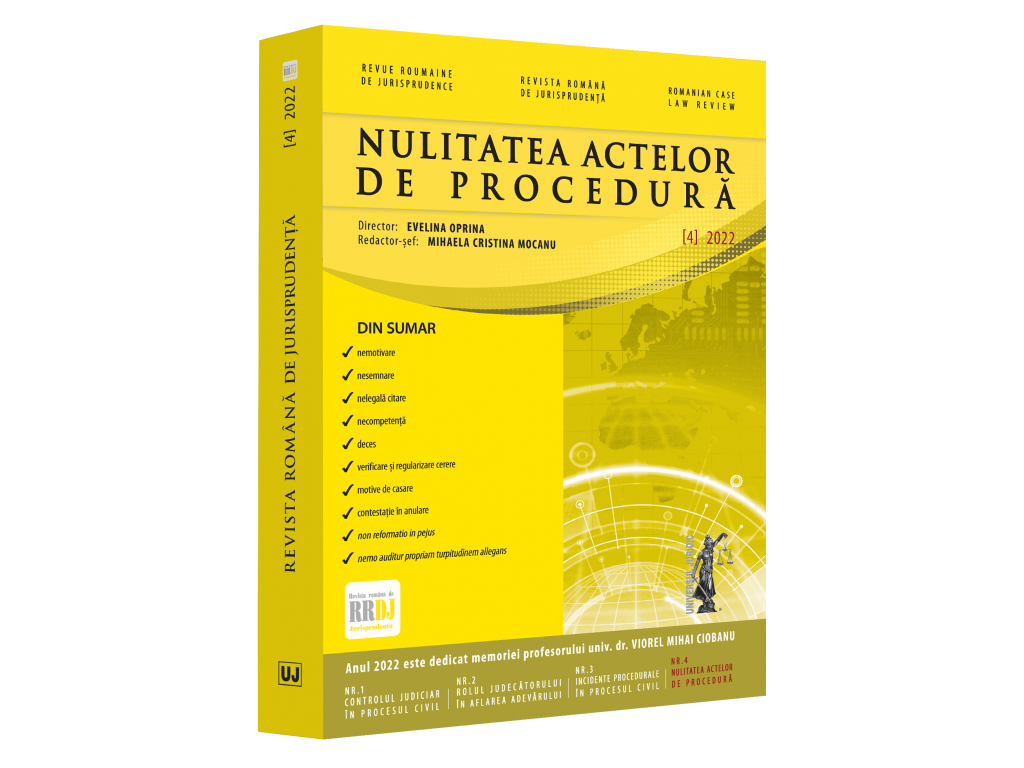Practical aspects of some procedural acts of disposition of parties in civil proceedings. Waiver of judgment. Acquiescence. Waiver of the subjective right claimed
VARIA
Abstract
The article aims at analysing the numerous and diverse typical and atypical problems raised in practice by some procedural acts of disposition of the parties in civil proceedings, namely the waiver of the judgment, the acquiescence or waiver of the appeal and the waiver of the subjective right claimed. Throughout the article, the idea is developed that, although on the surface these procedural incidents appear to be easy to apply, in reality, in view of the drastic and often extinguishing effects they have on the assets of the party who disposes of the property, they require greater attention and diligence on the part of the judge called upon to establish them, a more active role both in identifying the real will of the party and in verifying compliance with the form it must take, when it is exercised personally by the party or by his representative with special power of attorney.
The paper reviews the similarities and differences between the three procedural acts of disposition analysed, reflecting on the intention of the legislator at the time the regulation was established, and then analyses the procedure by which the waiver of the judgment is acknowledged according to the procedural moment in which it occurs, before the court of first instance, prior to the communication of the claim with the defendant and up to the extraordinary appeal, reflecting also on the waiver of the waiver, its limits and the situation where the apparent waiver conceals other institutions such as the claim becoming devoid of purpose as a result of the defendant's performance of his obligation during the proceedings, or a reduction in the amount of the claim under Article 204 para. (2), para. 2 of the Civil Procedure Code Interesting discussions also arise around the procedure to be followed by the court in the event of a partial waiver of claims in the course of the proceedings, the doctrinal controversies arising from an insufficient regulation of this atypical situation in which, on the one hand, the judge must take note of the partial waiver, but on the other hand, he must continue the proceedings in the same case for the remaining claims.
Judicial review of acts of disposition, the conditions for the exercise of the appeal, the time limit for appeal in the case of special procedures, but especially the limits and content of the appeal, are also topics of reflection that have been deepened both doctrinally and through extensive references to the jurisprudence of the Supreme Court.
There are also atypical approaches, perhaps difficult to accept at first sight, which are intended to overturn some stereotypes, to rethink solutions that have been established in practice for many years, perhaps formally applied without sufficient attention to the substance of the regulation, such as the order of settlement in the event that the party wishes to waive the judgment or the subjective right claimed but has not previously requested a default judgment or has not paid the stamp duty as a priority. The question also arises as to whether the waiver of judgment in the plaintiff's own appeal could be considered an exception to the principle of non reformatio in peius, and the connection between the waiver of judgment and the perimeter as a presumption of waiver is analysed.
The end of the paper brings us close to the presentation of some more interesting solutions from the case law of the High Court of Cassation and Justice on the subject of procedural acts of disposition, but also a presentation of how the same institutions analysed throughout the article are reflected in French legislation and case law, a comparative law analysis being always beneficial in order to deepen the institutions presented.
Finally, the article calls for flexibility and open-mindedness in the interpretation and application of the law, especially in this matter of procedural acts of disposition of the parties, in order to give priority to the parties' will in the letter and spirit of the law.
Keywords: procedural acts of disposition, waiver of proceedings, acquiescence, waiver of appeal, waiver of alleged subjective right, effects of waiver, waiver procedure, partial waiver of claims, limits of appeal on procedural acts of disposition, HCCJ case law, French law.








